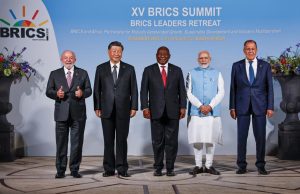Even as India has courted rival geopolitical blocs led by China and Russia in recent years, many in Washington argue that India’s presence in those groups is useful to the United States. By being part of those blocs, they argue, India would prevent China and Russia from getting their way.
That theory was tested and possibly put to bed when Brazil, Russia, India, China, and South Africa met for a BRICS summit in Johannesburg last week. After a series of negotiations and reported discord, the BRICS formally invited six new nations from Asia, Africa, and Latin America to fashion what seems like a counterweight to the West.
For Russia’s President Vladimir Putin and China’s President Xi Jinping, the circumstances under which the new members were chosen seemed like a major coup. The settlement consolidated their influence both within the BRICS and the broader Global South and constituted a strong challenge to the West.
The decision to include Iran would prove most contentious in Washington, given U.S. sanctions on Iran, Iran’s fast-growing nuclear program, and its role as a supplier to Russia in the Ukraine war.
But perhaps even more significantly, the BRICS expansion would bring together Iran and Saudi Arabia — long-time rivals in the Middle East who have pivoted strongly toward China in an effort to counterbalance U.S. hegemony in that region. By bringing them together at the BRICS, Xi and Putin have sent a powerful message of their ability to transcend regional geopolitics in favor of a global cause against the West.
Xi’s influence could also be perceived in other matters. In the run-up to the summit, Indonesia was reported to be a frontrunner for inclusion. That would have made sense, considering Indonesia’s pivotal role in the Indo-Pacific, its status as a G-20 economy, and its youthful demographics. But in recent years, Indonesia has had run-ins with China over the South China Sea and pivoted toward a military partnership with the United States. In the end, Indonesia did not feature on the list of invitees.
The rest of the line-up of new members was also heavily loaded with geopolitical significance. Under President Abdel Fattah el-Sisi, Egypt’s ties with the United States have been strained by the former’s human rights violations. Ethiopia has also been at odds with Washington over an ongoing civil war and humanitarian concerns. And Argentina continues to worry the U.S. with its endless economic woes and China’s outsized role in its lithium industry. All three countries have been looking to China for support in an effort to dilute Washington’s influence.
The decision to extend BRICS membership to countries with deepening strategic ties with China and Russia puts India in a bind.
Many believed that New Delhi was resisting the expansion effort for fears of turning the BRICS into a club of nations aligned against the West and challenging U.S. hegemony. But if India did indeed resist, it ultimately proved unsuccessful. In addition to its membership in the Shanghai Cooperation Organization (SCO), India must now contend with a BRICS that would likely be more skeptical of the West.
Analysts in Washington might believe that India sees its participation in the BRICS and SCO as a necessary inconvenience. But in recent years, India has also expressed its own interest in counterbalancing Western hegemony in global forums, checking the dominance of the dollar, and curtailing liberal norms on sundry issues. On substantive matters, there is little indication that India is notably out of step with the rest of the BRICS.
To be sure, India does still have narrower interests that drive it toward Washington. In the face of border tensions with China and a dire need to bolster its military capacity, India recognizes that it is somewhat dependent on the United States. In technically advanced areas such as cybersecurity and artificial intelligence, for instance, India sees few alternatives to the U.S. To that extent, New Delhi is worried about alienating the West — for fear of losing out on capacity-building cooperation.
Yet, in many ways, it’s the United States — and not the BRICS or the Global South — that is today a necessitated inconvenience for Prime Minister Narendra Modi. Given its desire for multipolarity on the world stage, the BRICS and SCO now sit more comfortably with India’s own grand strategy ambitions than the Quad. And if last week’s proceedings in Johannesburg were any indication, India’s ability to counterbalance China and Russia in these blocs is anyway severely limited.

































